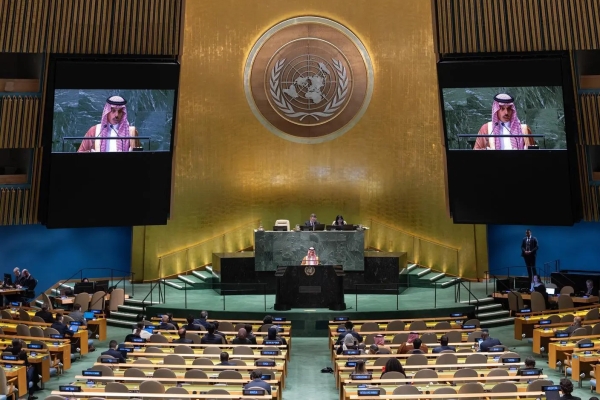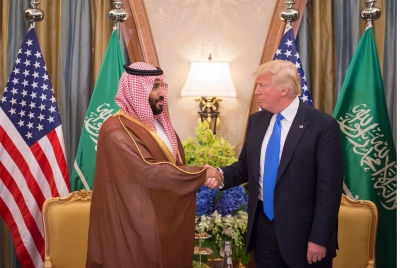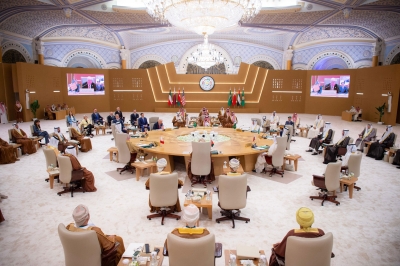

The Kingdom of Saudi Arabia in the United Nations (UN) is a founding member, having signed the organization's charter in 1945. The first permanent Saudi mission to the UN in New York was established in 1948, led by Ambassador Asad al-Faqih, who had previously served as the Kingdom’s first ambassador to the United States before his appointment as head of the Kingdom’s delegation to the UN. The mission assists the Kingdom’s government in managing the Kingdom’s policies within the UN.
The headquarters of the Kingdom’s mission is located at 809 United Nations Plaza, tenth floor, New York City, USA.
Figures who Led Saudi Arabia’s delegation to the UN
Several kings and princes have led the Kingdom’s delegations during the UN General Assembly meetings, including King Faisal Bin Abdulaziz Al Saud, who attended the UN’s founding meeting in 1945 as deputy to the founding King Abdulaziz Bin Abdulrahman Al Saud and the foreign minister at that time. King Saud Bin Abdulaziz Al Saud led the delegation in 1957, making him the first Saudi king to participate in the UN General Assembly meetings in 1957. In his address before the General Assembly at the time, King Saud expressed that "the world welcomed the UN Charter, ushering in a new dawn of peace, freedom, and hope among all nations." King Faisal again led the delegation in 1962, followed by Prince Sultan Bin Abdulaziz Al Saud in 1985, 1995, and 2005. King Abdullah Bin Abdulaziz Al Saud led the delegation in 2000 as Crown Prince, Prince Saud al-Faisal in 2003 as foreign minister, and King Salman Bin Abdulaziz Al Saud in 2020.
Saudi Arabia’s support for the United Nations
The Kingdom’s efforts extend beyond attendance at UN meetings as it actively provides financial, logistical, and in-kind support, as well as initiatives for the UN, its agencies, committees, and affiliated organizations. The Kingdom ranks among the top financial contributors to various UN funds, supporting UN humanitarian response plans in disaster-stricken countries, peacekeeping missions, and global child protection and support programs. Its contributions also extend to numerous other humanitarian and relief programs, such as mitigating the impact of natural disasters, combating poverty, and preventing diseases.
In 2021, amid the COVID-19 pandemic, the Kingdom provided support to the UN and international relief efforts to combat the pandemic, contributing USD500 million to global relief efforts against COVID-19, along with an additional USD500 million to other international and regional health organizations and programs.
The symbolic presence of Saudi Arabia in the UN
As a permanent member of the organization, the Kingdom represents an Arab and Islamic voice at the UN, with its leaders' speeches consistently defending Arab and Islamic causes while supporting global peace and security. The Kingdom’s policies align closely with UN values, especially regarding peacekeeping worldwide and the rejection of extremism and terrorism.
Permanent representatives of Saudi Arabia to the UN
Several prominent diplomats from the Kingdom have served as permanent representatives to the UN, including Asad al-Faqih (1948–1954), Ahmad Asaad al-Shukairy (1955–1962), Jamil Murad al-Baroody (1963–1979), Samir Shihabi (1983–1992), Gaafar Mostafa Allagany (1992–1999), Fawzi Abdulmajeed Shobokshi (1999–2006), Khalid Abdulrazzaq al-Nafisi (2006–2011), and Abdallah Yahya al-Mouallimi (2011–August 2022).
On August 3, 2022, Ambassador Abdulaziz Mohammed al-Wasil presented his credentials as the Kingdom’s permanent representative to the UN, succeeding Ambassador al-Mouallimi.
Saudi Arabia’s role in the UN
The Kingdom holds memberships in several UN organizations and committees, including the United Nations Country Team (UNCT), the World Trade Organization (WTO), the Singapore Convention on Mediation, the United Nations Framework Convention on Climate Change (UNFCCC), the United Nations Convention against Illicit Traffic in Narcotic Drugs and Psychotropic Substances, the United Nations Convention on the Law of the Sea (UNCLOS), the United Nations Convention to Combat Desertification (UNCCD), the United Nations Convention against Transnational Organized Crime (UNTOC), the United Nations Convention against Corruption (UNCAC), the UNESCO Convention on the Means of Prohibiting and Preventing the Illicit Import, Export, and Transfer of Ownership of Cultural Property, the UNESCO Convention on the Protection of the Underwater Cultural Heritage, the International Association of Permanent Representatives to the United Nations, and the Intergovernmental Committee for the Safeguarding of the Intangible Cultural Heritage within UNESCO.
The Kingdom has contributed to the UN by proposing draft resolutions that the organization later adopted, including the proposal by King Abdullah in 2006 to establish an international center to combat terrorism. That same year, the UN adopted a resolution to that effect. King Abdullah also advocated for dialogue among followers of different religions and cultures worldwide, which led to the signing of an agreement establishing the King Abdullah Bin Abdulaziz International Center for Interreligious and Intercultural Dialogue (KAICIID).
Related quizzes
Related articles

